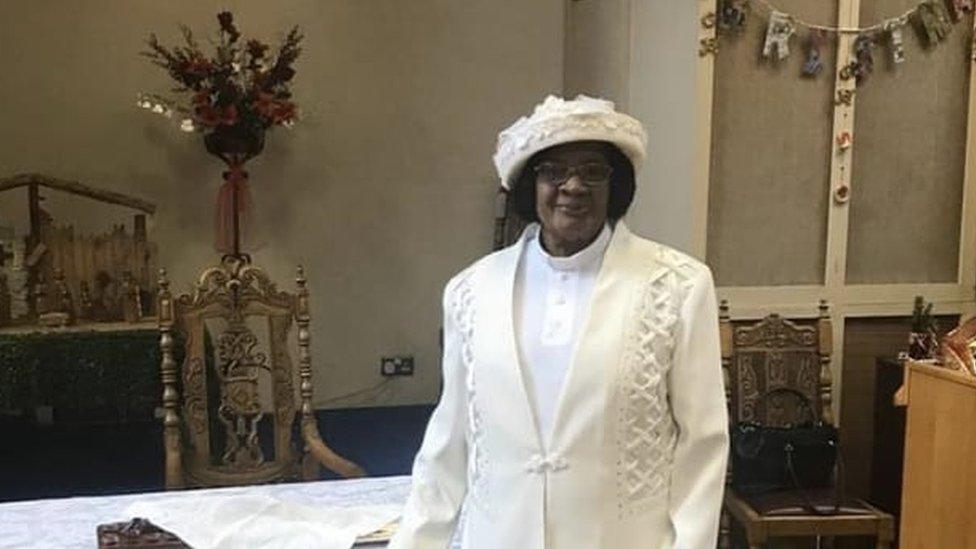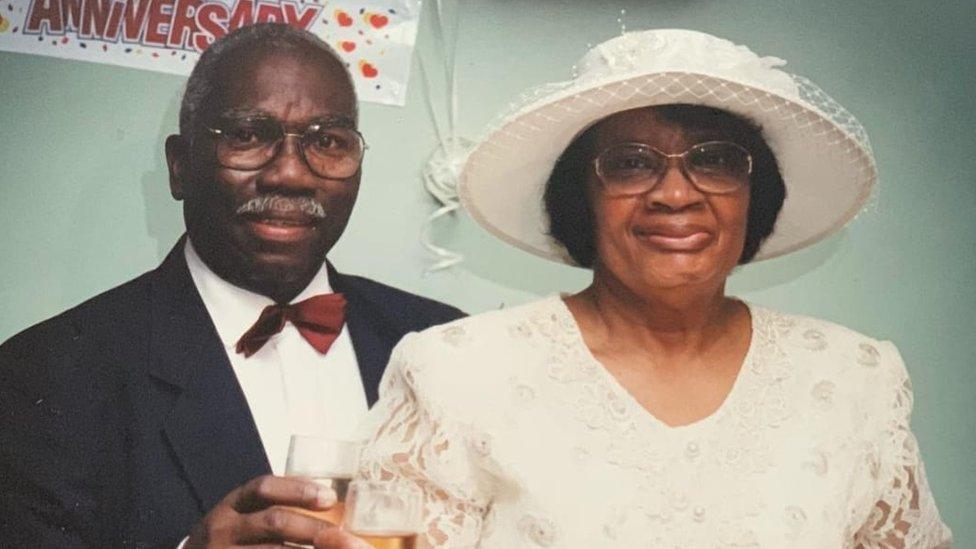Coronavirus cases to be tracked by ethnicity
- Published

Sylvia Douglas, 82, was a pastor and died after becoming infected with coronavirus
Public Health England is to start recording coronavirus cases and deaths by ethnicity, BBC News understands.
It comes after research suggests people from black, Asian and minority ethnic backgrounds are at greater risk of becoming seriously ill with Covid-19.
Downing Street has commissioned an investigation into the issue.
Communities Secretary Robert Jenrick said: "There does appear to be a disproportionate impact of the virus on BAME communities in the UK."
Speaking at the daily Downing Street press conference, he added: "It is for that reason that the Chief Medical Officer commissioned work from Public Health England to better understand this issue. It is right we do thorough research swiftly, so we can better understand it and then take any action that is required."
The Intensive Care National Audit and Research Centre, external found that 34% of more than 4,800 critically-ill patients with Covid-19 identified as black, Asian or minority ethnic.
This is despite only 14% of people in England and Wales being from ethnic minority backgrounds, according to the 2011 census.
Robert Jenrick: "There does appear to be a disproportionate impact of the virus upon BAME communities".
'Risk assess certain groups'
Almost three-quarters of the 51 healthcare workers whose deaths have been announced are also from BAME backgrounds, BBC analysis shows.
Dr Chaand Nagpaul, chair of the British Medical Association, said it was vital to find out why ethnic minorities are disproportionately affected.
"We must do everything we can now to prevent further deaths," he said.
"We may need to risk assess certain groups of NHS workers if they are older or have other medical conditions - they should be shielded and prevented from exposure to the virus."
Dr Nagpaul said there was not enough data on why there was greater illness and deaths being seen in ethnic minorities because it was not routinely collected.
He also said death certificates currently don't have information on ethnicity, so it is not possible to see if other factors have played a part.
'Not the right treatment'
Robert Murray, 56, said his family was concerned about the treatment his aunt had received in hospital and were "extremely upset" to be told by staff they were "not going to do much for her".
Sylvia Douglas, a pastor at Bethel United Church in Slough, was admitted to Wexham Park Hospital by ambulance on 1 April after developing breathing problems following a dry cough.

Sylvia and husband Aston Douglas
The 82-year-old, who had high blood pressure, tested positive for coronavirus and died the next day after being placed on a continuous positive airway pressure (CPAP) machine.
Mrs Douglas, who was part of the Windrush generation, was described by her family as a "caring, kind and supportive woman" who was hugely loved by her community.
"We were all shocked that she died so quickly and thought she would pull through," Mr Murray said.
"We would really like some clear answers about what happened in those last hours so we can feel confident that we're not being treated differently in the system."
'Distrust of authorities'
De-Shaine Murray, 25, from the West Midlands, said he was concerned about "ridiculous" suggestions on social media suggesting black people could not contract the disease.
The bioengineering PhD student from Imperial College London said the government needed to do more to reach communities who "historically already have distrust of certain authorities".
An undertaker from London, who asked to be anonymous, told the BBC he usually processed three deaths a week but was now "preparing three a day".
"I think the NHS is simply overwhelmed coping with Covid-19 patients and those admitted with more common health concerns," he said.
"We've had relatives saying their elderly loved ones went into hospital even with underlying health conditions and passed away after being admitted within days."

A SIMPLE GUIDE: How do I protect myself?
HOPE AND LOSS: Your coronavirus stories
LOOK-UP TOOL: Check cases in your area
VIDEO: The 20-second hand wash

Dr Riyaz Patel, associate professor of cardiology at University College London, said there were numerous reasons why black and Asian patients could be at greater risk.
These include socio-economic factors, such as BAME patients being more likely to live with many different generations in the same household and in densely populated areas, as well as biological factors.
"One thing very visible to us in London intensive care units now is how diabetes, high blood pressure and possibly being a little overweight, seem to be such potent risk factors for having a severe lung illness, perhaps even more so than having an existing lung disease which you would think would be a greater risk," Dr Patel said.
"All of these risk factors are more common in Black and Asian patients, so there could be a link here which needs further exploration."
The research on critical care patients with Covid-19 also found:
the average of patients was 59.5 years
there were nearly three times the number of men as women - 72% male; 27.9% female
more than a third were overweight - with a BMI of 25-30
38% were obese - with a BMI of over 30
the younger the patient, the more likely they were to survive

How have you been affected by the issues relating to coronavirus? Share your experiences by emailing haveyoursay@bbc.co.uk, external.
Please include a contact number if you are willing to speak to a BBC journalist. You can also contact us in the following ways:
WhatsApp: +44 7756 165803
Tweet: @BBC_HaveYourSay, external
Send pictures/video to yourpics@bbc.co.uk, external
Please read our terms & conditions and privacy policy